Is soy this amazing plant compound that fights cancer, and supports your heart and bones, or is it something that will damage your thyroid gland and make your hypothyroidism worse?
Well, it depends on which study you are looking at!
In a nutshell, this is the soy controversy and this is why we are taking the time to break down the facts.
There’s no question that the foods that you put into your body have an impact on your overall health.
Putting the right foods into your body can reduce inflammation, support thyroid function, and help you feel better.
On the other hand, putting highly processed and inflammatory foods into your body will cause you to gain weight, increase your risk of developing cancer, and cause many other problems to your health (1).
The real question is this:
Where does soy fall? Is it a “good” thyroid good or a “bad” thyroid food?
The answer, like always, is probably somewhere in the middle.
Today we are going to talk about this topic, specifically in the context of thyroid patients.
Why? Because my blog and website focus almost solely on that very topic!
In this article, I’m going to make the case as to why I believe that MOST thyroid patients are better off avoiding foods that contain soy.
Article highlights:
- Some medical studies show that soy may be beneficial while others show that it may be harmful but soy is probably best avoided in thyroid patients for the following reasons.
- Soy can stimulate estrogen receptors potentially leading to weight gain and other estrogen-related symptoms.
- Soy can act as a goitrogen by blocking the uptake of thyroid hormone and making thyroid function worse.
- Soy is heavily processed which may remove the beneficial ingredients in many soy products.
3 Reasons Why I recommend that Soy Be Avoided If You Have a Thyroid Problem
When you take a look at the research and dietary studies on soy you will find that there is a split down the middle.
There are a handful of studies that show that soy is potentially helpful, a handful of studies that show that it may not be helpful, and a handful of studies that show that it may be harmful.
What is a thyroid patient supposed to do?
Put your head in the sand, plug your ears, and keep on putting foods into your body that may or may not be good for your thyroid?
Please don’t!
Instead, I want to break down 3 solid reasons why soy has the real potential to cause problems for thyroid patients.
And you don’t have to get deep into the research to understand these concepts.
Let’s jump in:
#1. Soy has an estrogenic effect on the body.
Soy products have what is referred to as an estrogenic effect in the body (2).
In simple terms, this means that there is some part of the soy which can interact with estrogen receptors.
This process sort of tricks your body into thinking that estrogen is impacting your cells when it’s really the soy doing it.
When soy interacts with the estrogen receptor it can cause a cascade of events that turn on your cell and impact your physiology.
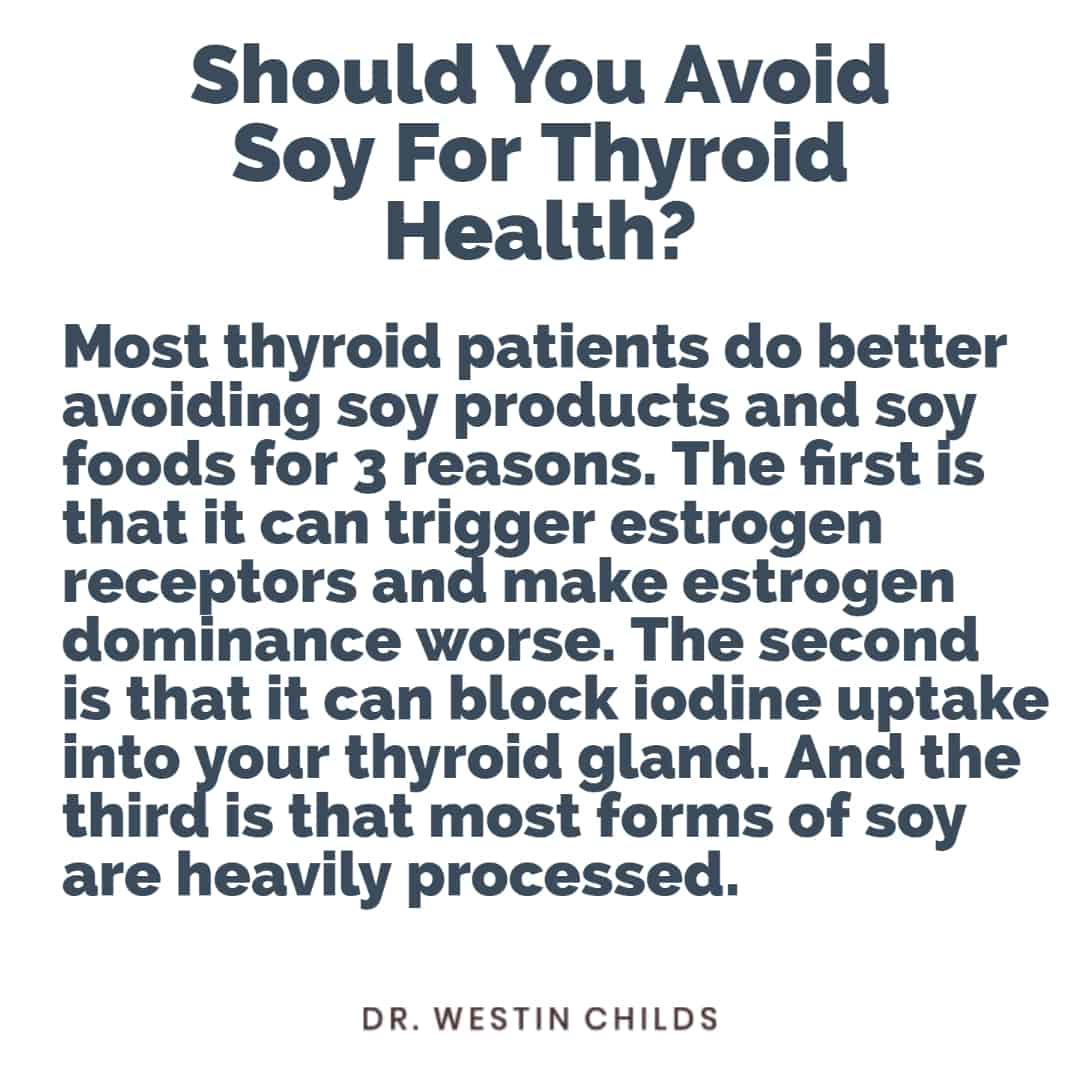
As a woman, you are probably well familiar with what this feels like.
If estrogen interacts with your breast tissue then it will grow and swell (often experienced as breast tenderness (3) during your menstrual cycle).
If estrogen interacts with fat cells then it may cause your fat cells to grow (which is what occurs in estrogen dominance syndromes).
If estrogen interacts with your heart cells then it may help prevent cardiovascular disease (which is why heart disease increases (4) as estrogen falls in menopause).
If estrogen interacts with your bones then it may prevent osteoporosis (which is why women have a decrease in bone mass when estrogen falls in menopause).
Soy can have this effect on various estrogen receptors in the body and on various cells in the body.
And, as you can see, it can sometimes be a good thing to impact estrogen receptors, especially if you are trying to do something like prevent heart disease later in life or to strengthen your bones.
This is probably why soy can be helpful for certain conditions such as improving the heart and potentially reducing your risk of certain cancers.
On the flip side, it can also be potentially harmful, especially if you are already overweight or suffering from estrogen-excess syndromes.
The problem with taking soy is that you can’t really control which type of estrogen receptors it’s going to trigger or impact which is why it may not be a good idea to use it if you have a thyroid problem.
Why?
Because many patients with thyroid problems tend to suffer from weight gain because of their low thyroid function.
And if you are already overweight the last thing you want to do is add more stimulation to your fat cells which may cause them to grow further.
In addition, being overweight predisposes you to excess estrogen circulating in your body.
Your fat cells are hormone sensitive tissues and they are capable of taking up androgens and turning them into estrogen.
If you already have excess fat on your body then you are most likely in a state of estrogen excess.

This, by the way, is why women who are overweight tend to have fewer menopausal symptoms when they enter menopause.
This may be a good thing for some women but it’s not really a good thing if you are a thyroid patient.
Taking soy, especially if you are overweight or obese, may cause excessive stimulation of estrogen receptors and exacerbate estrogen dominance states or syndromes.
#2. Soy can act as a goitrogen.
There’s no disputing the fact that soy has what is referred to as a goitrogenic effect on the thyroid.
If something is acting as a goitrogen it means that it is blocking the uptake of iodine into the thyroid gland.
And this is something that soy does.
In addition, there are also some studies that show that if you put soy in contact with thyroid peroxidase, it may cause issues with this enzyme.
Fortunately, it doesn’t look like this is a big problem in the real world but it’s still worth mentioning here.
For now, I want to focus on the goitrogenic effect that soy can have.
For most people, this blocking of iodine is probably very small and manageable provided that you are consuming enough iodine.
And that’s the key here, provided you are consuming enough iodine.
Even though goitrogens can block iodine uptake into the thyroid gland you can overcome this blocking by simply taking more iodine.
If there is more iodine than there is goitrogen, then the iodine will be able to get through the blockade and you won’t have any issues.
We have to put this knowledge into context with how most thyroid patients feel about iodine.
The truth is that many thyroid patients have an irrational fear of iodine, or they were told to avoid it by their doctor, or they believe that it may trigger Hashimoto’s, and, therefore, they are not consuming enough.
So if you are someone who is already not consuming enough iodine then even small amounts of soy may be enough to block what little iodine you have floating around in your body from getting into your thyroid gland.
If this occurs then you will have issues in producing thyroid hormone and it may actually have a negative impact on thyroid function.
Does this mean that every single person who is consuming soy products will have low thyroid function because they can’t get iodine into their thyroid gland?
No, probably not.
But it is absolutely something you should be aware of especially if you are someone who is actively avoiding iodine!
If you are someone taking supplements that contain iodine already then consuming soy will probably not have any impact on thyroid function.
#3. Soy is heavily processed and around 90% of all soy products are genetically modified (GMO).
Another big reason to avoid soy is that the vast majority of all soy products are heavily processed and genetically modified.
When you break apart the soy compound you will find that many of the beneficial health effects come from something called soy isoflavone (5).
This isoflavone is the flavonoid or plant compound found in soy products and it is this ingredient that is felt to be the main reason why soy may help prevent breast cancer and protect the heart.
But there’s one big problem:
The processing of soy removes a huge amount of this very ingredient!
So if you are consuming soy products hoping to get these beneficial effects, but you are consuming a processed version, then you are probably not getting anywhere near the level that your body needs.
Not only does processing remove beneficial ingredients like isoflavone, it also has the potential to result in inflammation.
Inflammation can wreak havoc in thyroid patients by reducing T4 to T3 conversion resulting in low levels of the most important thyroid hormone T3.
I’ve talked a lot about food processing and why it causes issues and why I recommend that thyroid patients avoid processed foods in articles such as this one.
The good news is that you can probably get around this particular problem by only consuming soy products that are non-GMO, organic, and that have not undergone processing.
So… Should You Use Soy?
Is there a situation in which you can consume soy if you have a thyroid problem?
The answer is yes.
If you break down the reasons I listed above for why it should be avoided, and if you don’t have to worry about these problems, then there may be a scenario in which you can reap the benefits from soy while avoiding the potential consequences to your thyroid gland.
If you are someone who is not already overweight (so you don’t have to worry about estrogenic activity, who is consuming enough iodine (so you don’t have to worry about the goitrogenic effect), and if you consume organic/non-processed version of soy, then you may not have any issues.
Having said all of this, you still should pay close attention to how your body reacts when you put soy into your body and diet.
It’s been my experience that most thyroid patients do feel better off of soy products and this number is much higher than those who can consume soy without any issue.
But if you are someone that really, and I mean really, loves soy products then you can give it a go and experiment with some trial and error.
Final Thoughts
While the science may be mixed when it comes to the benefits of soy consumption, I think the data is quite clear when it comes to thyroid patients.
In most cases, and for most thyroid patients, the cons of consuming soy far outweigh the pros which leads me to believe that most thyroid patients are better off avoiding it.
Having said that, there may be situations in which soy consumption is both safe and beneficial for thyroid patients.
Now I want to hear from you:
Are you someone avoiding soy?
Did you know that soy could be potentially harmful to your thyroid gland?
Are you someone actively consuming soy and avoiding iodine?
If so, do you think soy is impacting your body’s ability to create thyroid hormones?
Let me know in the comments below!
Scientific References
#1. https://www.ncbi.nlm.nih.gov/pmc/articles/PMC4034518/
#2. https://www.ncbi.nlm.nih.gov/pmc/articles/PMC4270274/
#3. https://pubmed.ncbi.nlm.nih.gov/12841883/
#4. https://pubmed.ncbi.nlm.nih.gov/24969415/
#5. https://lpi.oregonstate.edu/mic/dietary-factors/phytochemicals/soy-isoflavones
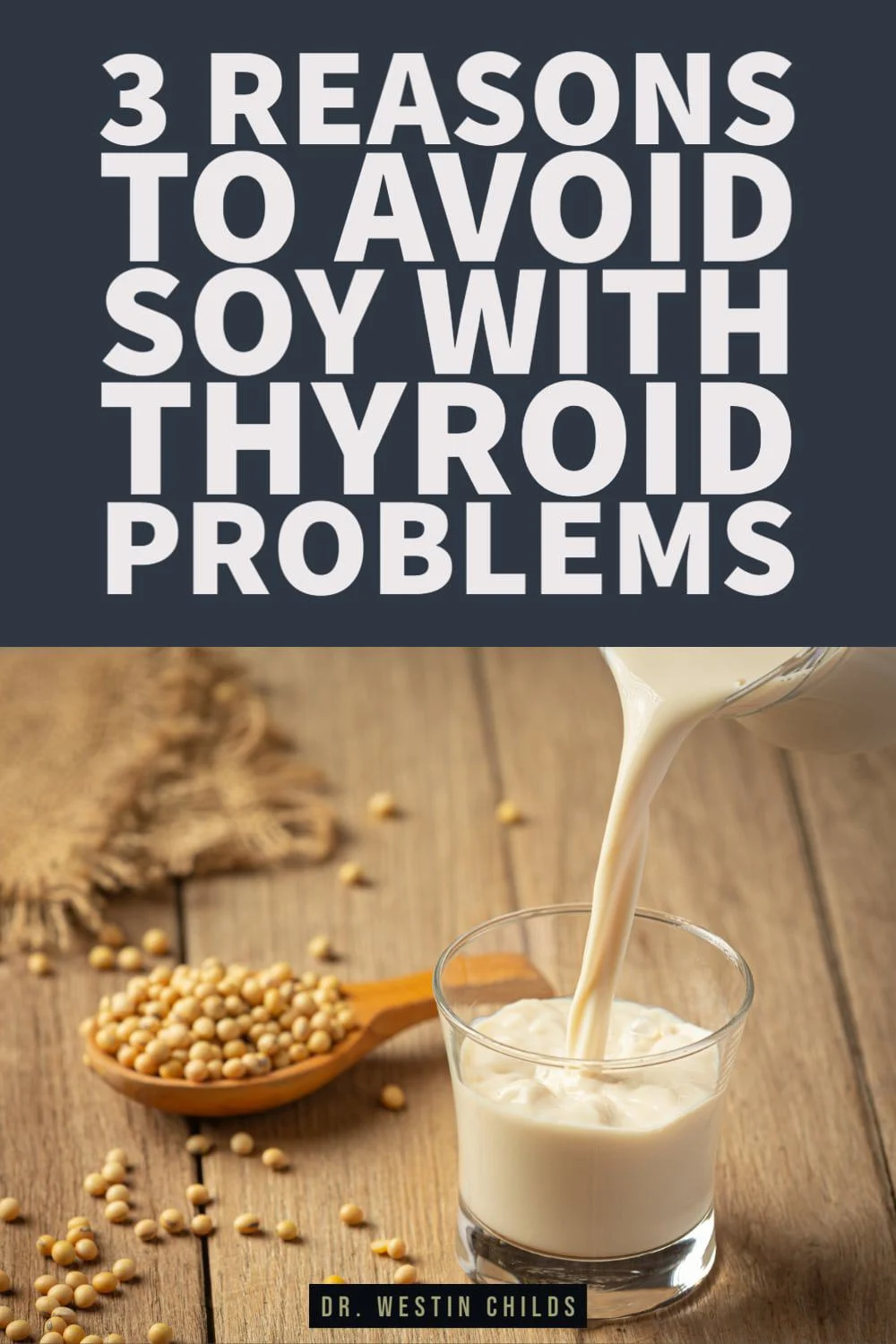
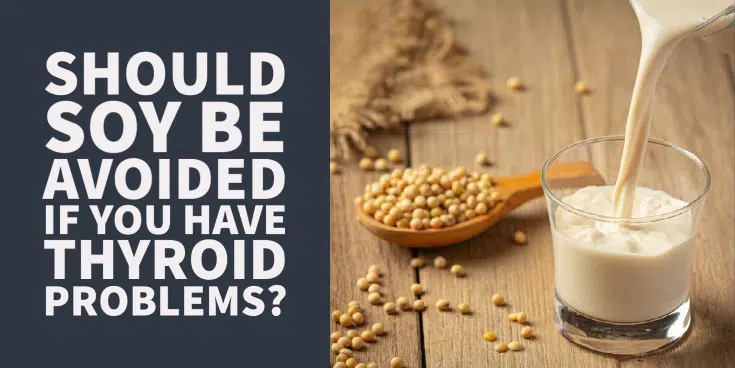



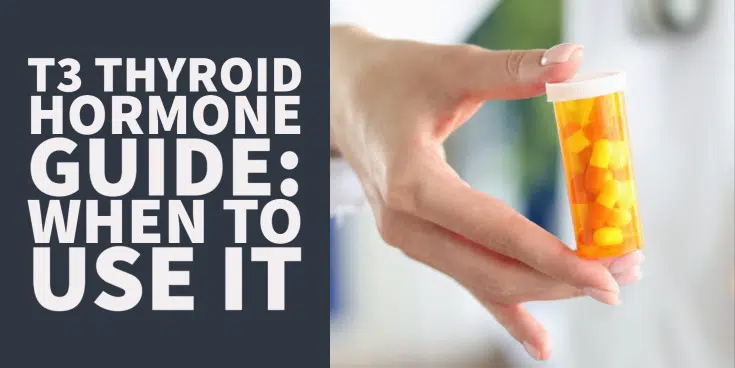
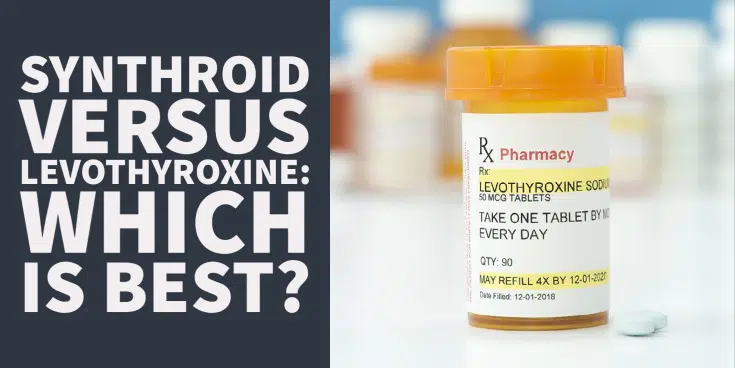

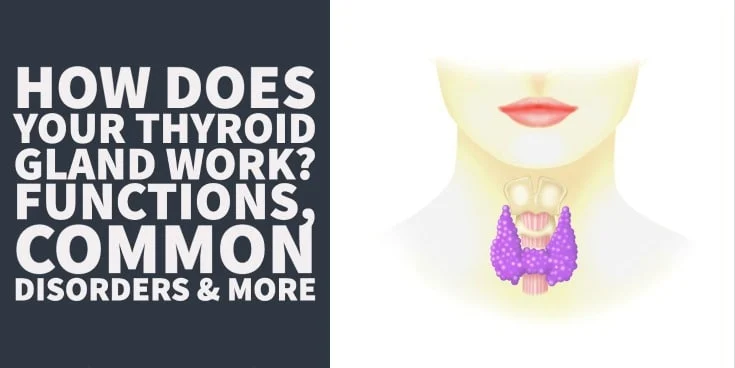
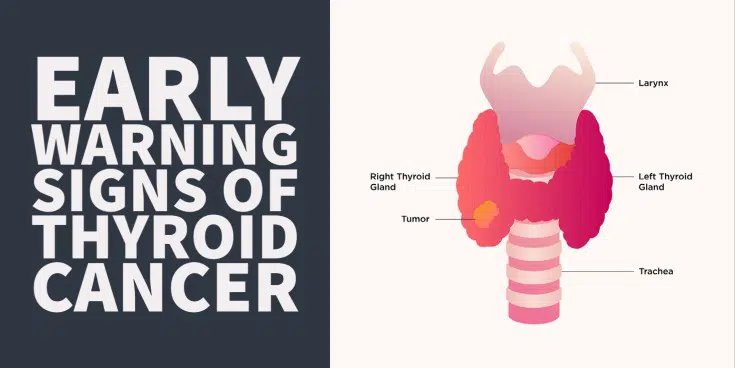

Thank you for your insight and advice about soy! I’m convinced that a whole food supplement containing soy triggered my unwanted weight gain. I will discontinue that supplement once and for all.
Hi Barb,
Happy to help!
Dr child’s
I am 76 yrs old have thyroid issues since high school, afib, pap machine doctors insist will help with irregular heartbeat & sleep apnea. I don’t know the recommended weight should be I’m 176 fluctuates by 1-3 lbs at times. I’m prescribed meds I hate taking them. So considering this would soy intake be fine at my age since it does pose heart benefits.
You were very informative however pros/cons on soy is confusing. Hope you can help.
Thank you for your time,
Barb
Hi Barb,
Generally, you would want to avoid any source of soy unless it’s an organic/non-GMO source. If you do want to consume that type of soy then you can go ahead and give it a try and see how you feel. The problem is that most soy products and ingredients (especially those in processed foods) are GMO and have most of their beneficial ingredients removed. So when you consume these foods you get all of the downsides and very little, if any, benefit.
So, after everything that you said, you didn’t say anything about FERMENTED soy. I know that every food that is ORGANIC, which includes Non GMO, is better for everyone to eat, but you didn’t specifically comment on FERMENTED SOY. Maybe I missed something.
Hi Billie,
Fermented soy was not mentioned but the principles would still apply. If you want to eat fermented soy then you would want to make sure that it is non-GMO/organic and slowly test it out to see how your body responds.
What about non-processed soy like edamame?
Hi Diane,
If you can find an organic version then it’s probably ok but you should evaluate it on a case by case basis.
What are your thoughts topically applied bio-identical estriol cream that contains soy?
Hi Phyllis,
In the case of estriol, the benefits probably outweigh any potential cons.
Thank you for you insight. I reap so many benefits from the bio identical estriol I was really hoping for this positive response.
Thank you as always! Do you have any recommendations for when you work with vegan/vegetarian patients with hypothyroidism? given soy products ( tofu, tempeh, etc.) are a huge component of their diet sometimes? or does the same thought process still stand?
Hi Mona,
I generally try to move people toward a more Pegan-type diet because I feel it’s better than vegan/vegetarian diets for thyroid disease. If you were to use a vegan/vegetarian diet then you’ll need to use the best of the options available to you because protein consumption is so important. You wouldn’t want to avoid soy completely, for instance, if that is your primary source of protein unless you were willing to swap it out for another source. These sort of things need to be determined on an individual basis based on the problems the person is facing, their weight, their thyroid function, and so on.
I have Hashimoto’s and eat tofu on very rare occasions in stir fries, but it’s always organic, non-GMO. I also use soy sauce, make marinades with miso (again occasionally) and make miso soup, but for the soup, I use my own homemade miso made from chickpeas, not soybeans. Should I cut these out completely? How about edamame or tempeh? I don’t consume any other soy products: no chips, milk, no soybean oil, no soybean flour, no fake “meats” made from soy, etc.
Also, you mentioned soy is a goitrogen. Cruciferous vegetables are also goitrogens. Should we not consume those? My doctor told me as long as they’re cooked, it should be okay. Thank you!
Hi Tina,
As mentioned in the article, there are situations in which consuming soy is probably beneficial but these should be made on a case-by-case basis. It’s not something I would be able to determine based on a comment, it’s more of something you’ll have to figure out on your own based on thyroid lab tests, how you are feeling, symptom management, etc.
When it comes to fermented soy, the benefits of those probably outweigh the potential cons for many people as long as they are not processed and organic.
The goitrogenic effect should always be looked at in conjunction with iodine intake. If you are avoiding iodine for whatever reason then the goitrogenic effect of vegetables would be amplified, for instance. But this can be adjusted by simply taking more iodine or by adjusting how you cook them.
You can learn more here: https://www.restartmed.com/goitrogens/
Thank you so much!
Thanks Dr Childs for talking about soy consumption and thyroid.
Here in Singapore is not easy to get food without soy so, I eat soy products quite frequently and not sure about my consumption of iodine!
About a year ago I asked to my doctor if there is any food restriction that I need to follow (I have Hashimoto’s almost 6 years ago). She said I don’t need to follow any special diet 🙁
Now I know there are some food to minimize or avoid.
Oh wait, what about soy sprouts in salads?
Hi Elvagris,
Please see these articles which can help you with your questions about diet and Hashimoto’s 🙂
https://www.restartmed.com/10-foods-hashimotos-patients-should-avoid/
https://www.restartmed.com/hashimotos-diet/
So I tried the Optavia food plan. Lost weight, felt amazing, blood pressure was back at normal for the first time in 3 years after having my twins. Went in for my blood work and my thyroid TANKED. The first ingredient in all of those optavia products was soy.
Hi Steph,
Most processed foods are soy-based so that isn’t surprising but I would say that the calorie restriction element of your diet was probably more responsible for your thyroid tanking than the soy (though they probably both contributed). Calorie-restricted diets tend to lower T3 levels and increase reverse T3 levels which is why I do not recommend them. The result is damage to both your thyroid and your metabolism and, ultimately, a regaining of all the weight that was previously lost.
I’m not very familiar with Optavia but I am assuming that it is one of those diet plans with processed food meals combined with calorie restriction. If that’s the case then what I said above applies.
You can read more here:
https://www.restartmed.com/thyroid-obesity-myth/
https://www.restartmed.com/hypothalamic-obesity-disorder/
I’m also curious about edamame. I do eat that a lot and I am overweight, but that happened much earlier than me eating edamame. I’ve had an underactive thyroid since I was about 7 and I am 56 now, so years of bad advice, wrong dose, no dose due to no health insurance and many other factors have lead to my weight gain. But, again, about the edamame?
Hi Anne,
Organic edamame would be ideal if you want to consume it. If it came down to eating organic edamame or eating something else that was processed, the edamame would be better! I would still say there are better options available to you but if they are not something you will consistently eat (or enjoy) then it would probably be better to stick with the edamame.
Dr Childs, I can’t thank you enough for the timeline of this article. I subscribe to your leptin reset program with my leptin resistance coming in at 63. I’m 65yoa, needed to lose 65 pounds (now 45 more). The weight is coming off using ALL modalities you recommend, but VERY slowly (5 lb average per month). I wonder if it has anything to do with the Lypo-Spheric Vitamin C that I swear by each morning with 1000mg of soy Phospholipids? I’ve used this for a decade, keeps me from getting colds/flus, but I am estrogen dominant. Your opinion please.
Hi Cater,
It’s unlikely that a small amount of soy would be hindering your progress that much but if you wanted to try avoiding it for a few months you could give that a try. If you were to do that then you’d have an idea if it was causing any issues.
Hello!
I love your thyroid supplements. Take them every day. I weened myself off of Naturthroid about two years ago and I believe taking your supplements for thyroid and adrenal function have been more effective than the prescription. So, thank you for that!
I strictly avoid processed foods, except for a very few that contain non-gmo, organic ingredients and no soy. I have just recently been consuming eggs from free- range birds whose diet is supplemented with scratch that contains soy oil. I was leary of that when I read the ingredient list, which the woman who raises them was kind enough to share. Is this something I should be concerned about? (The price of organic, pastured eggs is through the roof and these are half that price!)
Hi Mondorff,
Great question! That small amount of soy will probably not have any significant impact on your overall health, to be honest. It’s possible (though unlikely) that it could but if you are otherwise feeling well then I wouldn’t worry too much about it.
I read an article regarding genistein from soy Isoflavones that it helped CAT they said because it is an extract that it doesn’t possess any goitrogens but I have read other pubmed articles regarding its safety. What if I used genistein from a different source such as kudzu? Would that give the same results?
Huh, this is really interesting! I always thought soy should be avoided because of a potential effect on the thyroid antibodies, in a way similar to gluten. But what you’re saying is that actually, there’s no direct connection to triggering antibodies? It’s the goitrogenic effect that’s negative, like when you consume raw/undercooked broccoli or kale?
Do you think it would be okay to consume some organic, gluten-free soy sauce about once a week in a stir-fry, since it’s fermented soy…? I’m asking because I’m really not enjoying the flavour of coconut aminos (a subsitute) and it’s also mighty expensive. Thank you so much – your website is my go-to resource for anything thyroid-related!
Hi Rosa,
I suppose you could make the argument that if soy is inflammatory that it may negatively impact thyroid antibody levels but I’m unaware of any literature or data which proves this to be the case.
In general, if your soy is fermented and/or organic then it’s probably okay to consume but your mileage may vary and you’ll need to see how your body responds/reacts to it.
As always, thank you for a well written article that clearly lays out the evidence, articulating the pros and cons of both sides. My understanding is that using said evidence, we all need to decide as individuals what works best for each of us.
I’m in my early 50s, not overweight (although i do have history of obesity), vegan for 10+ years, hypothyroid, and eight years post hemi-thyroidectomy. I do eat soy regularly (organic and non GMO tofu and tempeh) and I have’t had any issues. I have however learned (first through other articles on this blog, and then through my personal experience), that maintaining healthy thyroid function is not dependent on merely my dose/type of medication, avoiding one or another type of food. Those things are important, but part of a larger puzzle that includes but is not limited to, taking the medications correctly, maintaining micronutrient levels, which (again for me) means optimal B12, vitamin D, Ferritin, and iron levels.
I was a thyroid patient in arguably one of the worlds best known academic medical centers, but didn’t get the help or the understanding I needed until I found this blog. There is a wealth of content in these articles. Please do yourself a favor, and take the time to read them carefully, and learn. You won’t be sorry.
Hi Melissa,
Glad to hear you find them helpful! Thanks for the feedback.
What about a soy isoflavone supplement (meant for hot flashes specifically and menopausal symptoms)? Are those impacting thyroid levels as well as they do act on the estrogen receptors?
Hi Tricia,
Yes, soy isoflavones can be goitrogenic, but it’s likely fine to continue using them as long as you increase your iodine intake.
Dr Childs, can you please clarify the topic on phytoestrogens? Not all estrogens are the same and phytoestrogens activate receptors in a positive way for example lower risks of breast and uterine cancers.
Hi EH,
I don’t have any articles on that topic but I’ll add it to the list of future topics to discuss!